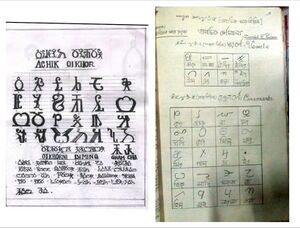A·chik Tok·birim
The A·chik Tok·birim is the tok·birim (alphabet) used by the Garo people. Their population is just over one million, living mainly in northeastern India (90%) and Bangladesh (10%).They call themselves A·chik Mande (hill + people) and are a matrilineal society, in which kinship is formed down maternal lines of ancestral descent.
They speak A·chikku, also known as Garo, a language that is part of the Tibeto-Burman family. It once had a written form, which has unfortunately been lost, and was later spelled out in Latin letters towards the end of the 19th century, leading to the publication of the first Bible in Garo, in 1924.
Now they have their own alphabet, called A·chik Tok·birim, devised by Arun Ritchil in 1979, and digitized by Waijy Ilias Marak in 2011. It has separate characters for individual consonants and vowels, whose names were taken from objects and natural phenomena:
- Adil, the name of the first letter, refers to a type of flute made of buffalo horns.
- Chi, the third letter, means “water.”
- Jajong, the ninth letter, refers to the moon, considered by ancient Garos as the god of the night.
- Saljong, the seventeenth letter, is the revered Sun God of the Garos, also known as Mitte Saljong.

The script is used to some extent in the village of Bhabanipur in northwestern Bangladesh.